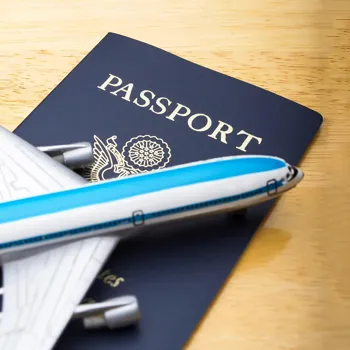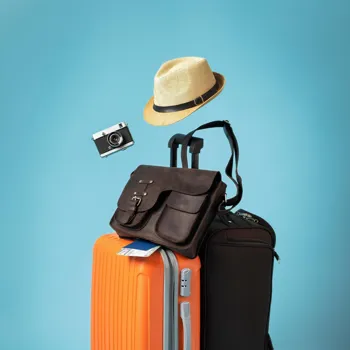Discover how to pick the perfect travel insurance for a worry-free trip. 10 essential tips await you!
Planning a holiday, be it a weekend getaway to Goa or a grand tour of Europe, is always exciting. But
before you pack your bags and mentally check out of work, there's a crucial detail that often gets overlooked: travel insurance.
Think of it as your safety net, your "jugaad" against unexpected events that could throw a wrench in your travel plans and your wallet. Choosing the right travel insurance can be a bit overwhelming, with so many options available.
To help you navigate this, we've put together 10 essential tips to ensure you get the best coverage for your needs, ensuring peace of mind.
First and foremost, understand the different types of travel insurance policies available.
There are single trip policies designed for specific vacations and annual multi-trip policies which are perfect for frequent travellers. Consider your travel habits. If you are planning multiple short trips within a year, an annual policy will most likely be more economical.
Next, determine the scope of coverage you need. Does it cover medical emergencies, trip cancellations, lost baggage, flight delays, or a combination of these? Read the policy wording carefully to understand what is included and excluded.
Most importantly, don't just blindly go for the cheapest option, because the lowest premium often comes with limited coverage, high deductibles, and lots of exclusions. Paying a bit more for a more comprehensive plan is often a worthwhile investment.
Check the coverage amount carefully before finalising any plan. Ensure that the medical coverage is sufficient to cover potential medical bills in the destination you are visiting. Some countries have very high medical costs, so a high coverage limit is essential.
Also, consider the coverage for trip cancellation and interruption, especially if you have non-refundable flight tickets or hotel bookings. Think about what you can afford to pay out-of-pocket in case of a claim.
It may be better to choose a higher deductible for a lower premium if this is the case.
Assess Your Travel Needs:
Before you start browsing policies, take a moment to assess your specific travel needs. "What kind of trip are you planning?" "Where are you going?" "How long will you be gone?" "What activities will you be involved in.

" Answers to these questions will help you determine the level of coverage you require. For instance, if you're going on an adventurous trek in the Himalayas, you'll need a policy that covers adventure sports and emergency evacuation.
However, A relaxing beach vacation might only require basic medical and baggage coverage. Likewise, if you have pre-existing medical conditions, you'll need to find a policy that covers them. A little bit of planning goes a long way in finding the right fit.
Compare Different Policies:
Don't settle for the first policy you come across. Take your time to compare different policies from various insurance providers. This means reading the fine print, comparing coverage amounts, and understanding the exclusions. Use online comparison tools to quickly compare quotes and features.
"Compare apples to apples," meaning ensure you're comparing policies with similar coverage amounts and deductibles. Read customer reviews and ratings of different insurance companies to get an idea about their claim settlement process and customer service.
A little research can save you a lot of headaches later on.
Understand the Exclusions:
One of the most important things to do before buying travel insurance is to carefully read the exclusions. Exclusions are situations or events that are not covered under the policy.
Common exclusions include pre-existing medical conditions (unless specifically covered), injuries due to extreme sports (if not specified in the policy), and losses due to illegal activities. Knowing what is not covered is just as important as knowing what is covered.
Don't assume that everything is covered. If you have any doubts, clarify them with the insurance provider before you purchase the policy.
Check the Claim Settlement Process:
A good travel insurance policy is only as good as its claim settlement process. Find out how easy it is to file a claim, what documents are required, and how long it takes for the claim to be processed. Look for insurance providers that have a reputation for quick and hassle-free claim settlements.

"Can you file a claim online, or do you need to fill out paper forms?". "Is there a 24/7 helpline available to assist with claims?" These are important questions to ask. Also, remember to keep all necessary documents, such as receipts, medical reports, and police reports, in a safe place.
Look for Add-ons and Riders:
Depending on your needs, you may want to consider adding optional add-ons or riders to your travel insurance policy. Typical add-ons include coverage for adventure sports, baggage delay, and personal liability. These add-ons can provide extra protection and peace of mind.
For instance, if you will be carrying expensive electronics or jewellery, you may want to consider additional baggage coverage. Similarly, if you're planning to rent a car, you may want to add rental car collision coverage.
Evaluate your needs and see if any additional coverage is worth the extra cost.
Consider COVID-19 Coverage:
In today's world, it's essential to consider COVID-19 coverage when purchasing travel insurance. Check if the policy covers medical expenses related to COVID-19, trip cancellations due to COVID-19, and quarantine expenses.
Some policies may have specific exclusions or limitations related to COVID-19, so be sure to read the fine print carefully. With the ever-changing travel restrictions and guidelines, having adequate COVID-19 coverage can provide significant peace of mind.
Don't assume it's automatically included; confirm it with the insurance provider.
Declare Pre-existing Medical Conditions:
It's essential to declare any pre-existing medical conditions when purchasing travel insurance. Failure to do so could result in your claim being rejected. Some policies may cover pre-existing conditions, while others may exclude them.

If you have a pre-existing condition, look for a policy that specifically covers it. You may need to pay a higher premium, but it's worth it to ensure you're covered in case of a medical emergency. Be honest and upfront about your medical history; it's better to be safe than sorry.
Keep a Copy of Your Policy Handy:
Before you leave for your trip, make sure to keep a copy of your travel insurance policy in a safe and accessible place. You can save a digital copy on your phone or tablet or print out a physical copy. Also, share a copy with a family member or friend back home.
Knowing your policy number, contact information for the insurance provider, and claim procedures will be crucial if you need to file a claim while traveling. Being prepared can make a stressful situation much easier to manage.
Emergency Assistance:
Check if the travel insurance company provides 24/7 emergency assistance. This is particularly important if you are traveling to a foreign country where language barriers or unfamiliar customs could make getting help difficult.
The emergency assistance team should be able to provide help with medical referrals, translation services, and coordinating emergency evacuation. It’s nice to know you have someone to call no matter what situation you encounter while abroad.
Always Shop Around:
Travel insurance prices can vary, sometimes dramatically, between providers. In order to save money, always shop around and get more than one quote. There are dozens of reputable companies which compete fiercely against each other.
By comparing quotes, looking at ratings, and reading customer reviews before buying, you’ll be well on your way to getting the best bang for your buck.
By following these ten essential tips, you can choose the right travel insurance policy and enjoy your trip with peace of mind.
Remember, travel insurance is not just an expense; it's an investment in your safety and well-being. Happy travels!
AI Generated Content. Glance/InMobi shall have no liability for the content










